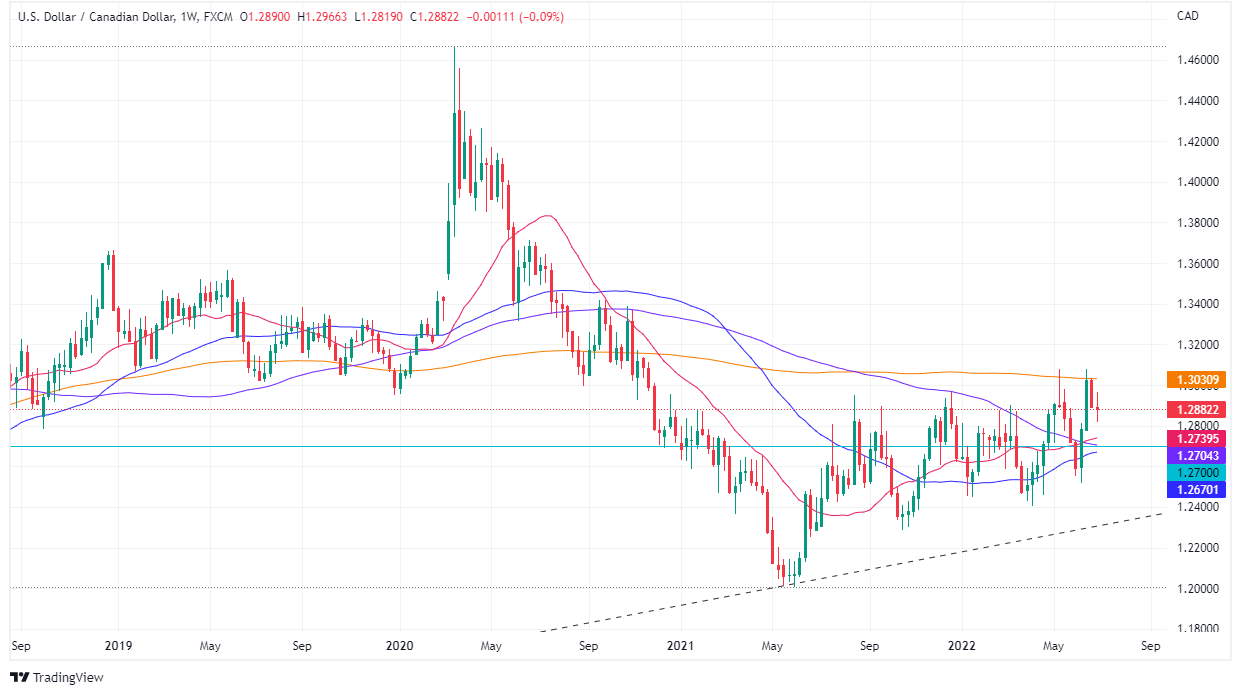USD/CAD marches steady around 1.2880, after US manufacturing data
- The USD/CAD ended the week almost flat amidst a volatile’s Friday session.
- Canada’s May GDP contracted by 0.2%, on its preliminary reading, a headwind for the CAD.
- US manufacturing data showed signs of slowing down; will the Fed slow its tightening pace?

The USD/CAD pares some of Thursday’s losses after reaching a weekly high of around 1.2960s but retraced below 1.2900 as the greenback weakened ahead into a long weekend, courtesy of the US Independence day. At 1.2882, the USD/CAD records minimal gains of 0.08% and finishes the week with losses of 0.09%.
Sentiment shifts, and the USD/CAD retreats from weekly highs to familiar levels
US equities finished with solid gains after the S&P 500 slumped by 20% since its peak in 2022. US manufacturing data, as reported by the Institute for Supply Management, released June’s Manufacturing PMI at 53.0, lower than the 54.9 expected prior at 56.1. Investors’ reaction was a counter-cyclical, buying the US dollar as a safe-haven play as fears of a US and a global recession increased.
On the USD/CAD side, the pair rallied sharply, from around 1.2900s to 1.2966, amidst falling US Treasury yields, as bond traders bought US Treasuries, which sent short-term US bond yields plunging more than ten basis points, in the case of 2s, 5s, and 10s. The US 10-year benchmark note finalized around 2.889%, down twelve basis points and 70 bps from the 2022 peak near 3.5%.
Data-wise, during the week, the Canadian docket revealed a GDP contraction of 0.2% MoM on May’s preliminary reading, while April was downward revised from 0.7% to 0.3% MoM. The data could deter the Bank of Canada (BoC) from hiking rates aggressively, though, at the time of writing, Short Term Interest Rates (STIRs) markets have priced in a 92% chance of a 75 bps rate hike in the July 13 meeting.
On the US front, June’s Consumer Confidence reported by the Conference Board, downtick towards 98.7, missing expectations of 100.4, and trailed May’s 103.2. Furthermore, US inflation, as measured by the Personal Consumption Expenditure (PCE), and the Fed’s favorite gauge of inflation for May, rose by 6.3% YoY, lower than the 6.7% estimated. Meanwhile, the so-called core PCE, excluding volatile items, rose by 4.7% YoY, lower than foreseen and less than April’s 4.9%.
The week ahead, the Canadian economic calendar will feature S&P Global Manufacturing PMIs and Employment data. On the US front, the docket will reveal the ISN Non-Manufacturing PMI for June, the US Federal Reserve’s last meeting minutes, and the US Nonfarm Payrolls report for June.
USD/CAD Weekly chart
USD/CAD Key Technical Levels
Author

Christian Borjon Valencia
FXStreet
Markets analyst, news editor, and trading instructor with over 14 years of experience across FX, commodities, US equity indices, and global macro markets.


















